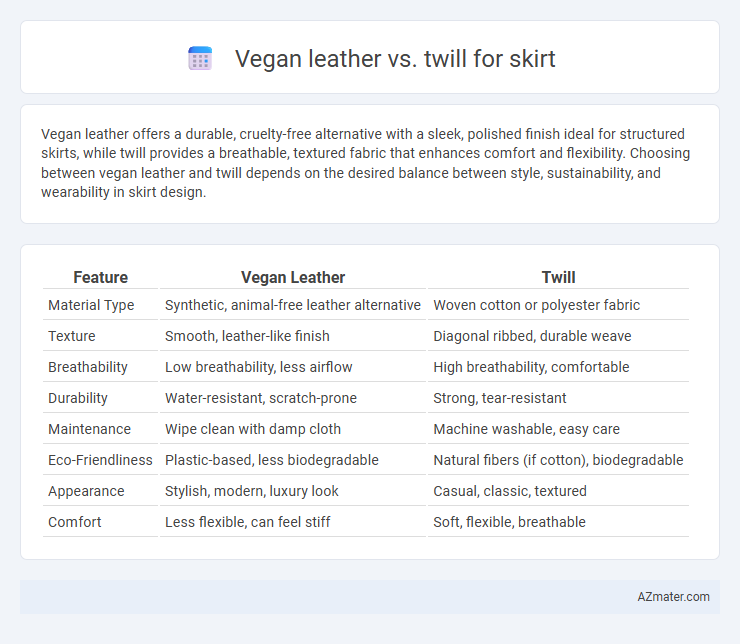Vegan leather offers a durable, cruelty-free alternative with a sleek, polished finish ideal for structured skirts, while twill provides a breathable, textured fabric that enhances comfort and flexibility. Choosing between vegan leather and twill depends on the desired balance between style, sustainability, and wearability in skirt design.
Table of Comparison
| Feature | Vegan Leather | Twill |
|---|---|---|
| Material Type | Synthetic, animal-free leather alternative | Woven cotton or polyester fabric |
| Texture | Smooth, leather-like finish | Diagonal ribbed, durable weave |
| Breathability | Low breathability, less airflow | High breathability, comfortable |
| Durability | Water-resistant, scratch-prone | Strong, tear-resistant |
| Maintenance | Wipe clean with damp cloth | Machine washable, easy care |
| Eco-Friendliness | Plastic-based, less biodegradable | Natural fibers (if cotton), biodegradable |
| Appearance | Stylish, modern, luxury look | Casual, classic, textured |
| Comfort | Less flexible, can feel stiff | Soft, flexible, breathable |
Introduction: Vegan Leather and Twill in Skirt Fashion
Vegan leather offers a cruelty-free alternative to traditional leather with a smooth, sleek finish that enhances skirt styles through durability and easy maintenance. Twill fabric, known for its distinctive diagonal weave, provides a soft, breathable texture and structured drape ideal for skirts that require flexibility and comfort. Both materials cater to different fashion needs, vegan leather emphasizing edgy sophistication while twill ensures classic versatility.
What is Vegan Leather? Materials and Production
Vegan leather is a synthetic alternative to traditional animal leather, typically made from materials such as polyurethane (PU) or polyvinyl chloride (PVC), as well as innovative plant-based sources like pineapple leaves, mushroom mycelium, and apple peels. These materials undergo processes like coating fabrics with polymer layers or bio-fabrication techniques to mimic the texture and durability of real leather without using animal products. Production of vegan leather involves lower environmental impact compared to conventional leather tanning, reducing water usage and eliminating harmful chemicals like chromium salts commonly used in leather processing.
Twill Fabric Explained: Composition and Weaving
Twill fabric, characterized by its diagonal rib pattern, is typically woven from cotton, polyester, or a blend, offering durability and breathability ideal for skirts. The weaving technique involves passing the weft thread over one or more warp threads, creating a distinctive diagonal texture that enhances fabric strength and resilience. Compared to vegan leather, twill fabric provides better comfort and moisture absorption, making it a practical choice for everyday wear.
Aesthetic Differences: Vegan Leather vs Twill Skirts
Vegan leather skirts offer a sleek, glossy finish with a modern, edgy aesthetic, often associated with high-fashion and statement pieces. Twill skirts provide a matte, textured appearance that conveys a casual, classic, and versatile style suited for everyday wear. The choice between vegan leather and twill significantly impacts the skirt's visual appeal, with vegan leather emphasizing boldness and twill emphasizing subtle sophistication.
Comfort and Wearability: Comparing Both Fabrics
Vegan leather offers a sleek, smooth texture that provides moderate breathability but can feel less flexible and warmer compared to twill. Twill fabric, characterized by its diagonal weave, delivers superior softness and breathability, enhancing comfort for extended wear. Both materials offer durable options for skirts, but twill excels in lightweight wearability while vegan leather is more resistant to moisture and stains.
Durability and Maintenance: Which Lasts Longer?
Vegan leather offers moderate durability and requires careful maintenance to prevent cracking and peeling, making it less suitable for frequent wear. Twill fabric is highly durable, resistant to wear and tear, and generally easier to maintain with regular washing and minimal special care. For longevity and low-maintenance, twill skirts tend to outlast vegan leather options, especially under frequent use.
Sustainability: Environmental Impact of Vegan Leather and Twill
Vegan leather, typically made from polyurethane or plant-based materials such as pineapple leaves or cork, offers a cruelty-free alternative but often involves synthetic processes with significant environmental footprints due to chemical treatments and non-biodegradable components. Twill fabric, commonly crafted from natural fibers like cotton or linen, tends to be more biodegradable and generally has a lower environmental impact when sourced responsibly and produced with sustainable agriculture practices. Choosing between vegan leather and twill for skirts depends on evaluating factors like resource consumption, carbon emissions, biodegradability, and potential for recycling within each material's lifecycle.
Styling Options for Vegan Leather and Twill Skirts
Vegan leather skirts offer a sleek, edgy aesthetic perfect for bold and contemporary styling, easily paired with chunky boots, oversized sweaters, or tailored blazers to create a streetwear or sophisticated look. Twill skirts bring a versatile, casual vibe with their durable cotton fabric, allowing effortless combinations with casual tees, denim jackets, and sneakers or ankle boots for a relaxed yet polished appearance. Both materials adapt well to layering, but vegan leather stands out in creating statement outfits, while twill excels in comfortable, everyday wear.
Price Comparison: Value for Money Analysis
Vegan leather skirts typically range from $40 to $150, offering a sleek, durable alternative to animal leather but often at a higher price point than twill skirts, which usually cost between $20 and $70 due to simpler fabric production. Twill skirts provide excellent value for money with breathable, easy-care properties suitable for everyday wear, while vegan leather delivers a premium look and water resistance, justifying the extra cost for fashion-conscious consumers. When prioritizing budget and functionality, twill is cost-effective; however, vegan leather offers enhanced aesthetic appeal and longevity, making it a worthwhile investment for sustainable fashion.
Choosing the Right Skirt: Vegan Leather or Twill?
Vegan leather offers a sleek, edgy look with water-resistant and durable qualities ideal for statement skirts, while twill provides breathability, comfort, and enhanced movement suited for casual or everyday wear. Considering the occasion and desired texture helps determine the best option; vegan leather suits formal or fashion-forward styles, whereas twill excels in relaxed, versatile skirts. Assessing factors such as maintenance, seasonality, and personal style preferences ensures a confident choice between vegan leather's polished finish and twill's softness.

Infographic: Vegan leather vs Twill for Skirt
 azmater.com
azmater.com